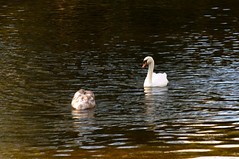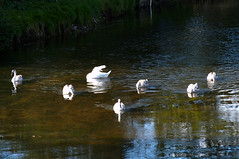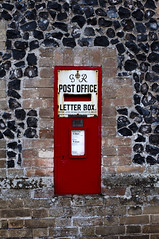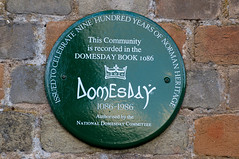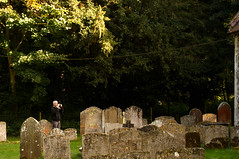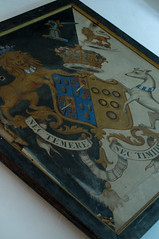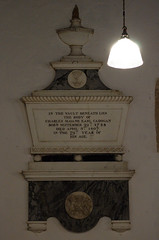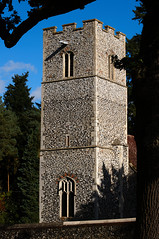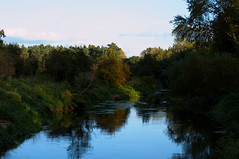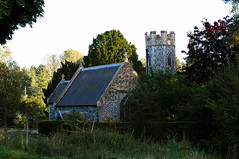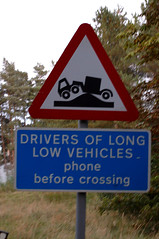This has turned out to be a somewhat topical entry, as Hilary Mantel has just won the Booker Prize for “Bring Up the Bodies”. It’s the second book of what will be a trilogy and is a novelisation of the life of Thomas Cromwell, one of Henry VIII’s more well known courtiers. The story can’t really be spoilt, as it’s following history pretty closely – Cromwell starts from humble beginnings and rises to prominence first as the servant of Cardinal Wolsey, and then manages to survive the Cardinal’s downfall going on to work directly for the King. He is important in the engineering of the break with Rome & the dissolution of Henry’s first marriage so that Henry can marry Anne Boleyn, then instrumental in the subsequent downfall & death of Anne. After this he first rises higher (and is even granted a title) but then his enemies contrive to bring about his execution after the failure of Henry’s fourth marriage (which was to a woman Cromwell had found and put forward as the right candidate).
So that’s an extremely simplified potted biography of the main character of the novels. I read the first book (“Wolf Hall”, which won the Booker prize in 2009) earlier this year, it covers the time of the Cardinal’s fall and Anne Boleyn’s rise as well as multiple flash backs to Cromwell’s early life. “Bring Up the Bodies” covers much less time – just the last year of Anne Boleyn’s life. And I would assume part 3 will take us through to his fall from grace & death.
This is a period of history I’m particularly interested in, so it’s not surprising that these books are right up my street. I also liked the style they’re written in – it’s (mostly) present tense, and while it’s (mostly) in third person it’s like it’s the story Cromwell is telling himself about what’s going on around him. As if he’s constantly editorialising inside his head about what’s happening and what it means. It’s also very stylised, which is a constant reminder that this world of the court of the Tudors isn’t our world, the people are obviously still people like us but they have different expectations, different ways of behaving, they see the world differently. And a lot of the story happens in the gaps between what people say, or in the meanings behind the words.
Here’s a bit from around the middle of the book, when Cromwell has trapped Mark Smeaton into confessing to adultery with Anne Boleyn. Cromwell is deciding who else to arrest from the string of names that Smeaton has given as also guilty and discussing it with Wriothesley (aka Call-Me-Risley). Thomas Wyatt is said to have been a lover of Anne’s before her marriage to Henry, and is a friend of Cromwell’s:
He turns. ‘Call-Me. You’re early today?’
‘I could not sleep. A word, sir?’
So today the positions are reversed, it is Call-Me-Risley who is taking him aside, frowning. ‘You will have to bring in Wyatt, sir. You take it too much to heart, this charge his father laid on you. If it comes to it, you cannot protect him. The court has talked for years about what he may have done with Anne. He stands first in suspicion.’
He nods. It is not easy to explain to a young man like Wriothesley why he values Wyatt. He wants to say, because, good fellows though you are, he is not like you or Richard Riche. He does not simply talk to hear his own voice, or pick arguments just to win them. He is not like George Boleyn: he does not write verses to six women in the hope of bundling one of them into a dark corner where he can slip his cock into her. He writes to warn and to chastise, and not to confess his need but to conceal it. He understands honour but does not boast of his own. He is perfectly equipped as a courtier, but he knows the small value of that. He has studied the world without despising it. He understands the world without rejecting it. He has no illusions but he has hopes. He does not sleepwalk through his life. His eyes are open, and his ears for sounds others miss.
But he decides to give Wriothesley an explanation he can follow. ‘It is not Wyatt,’ he says, ‘who stands in my way with the king. It is not Wyatt who turns me out of the privy chamber when I need the king’s signature. It is not he who is continually dropping slander against me like poison into Henry’s ear.’
Mr Wriothesley looks at him speculatively. ‘I see. It is not so much, who is guilty, as whose guilt is of service to you.’ He smiles. ‘I admire you, sir. You are deft in these matters, and without false compunction.’
He is not sure he wants Wriothesley to admire him. Not on those grounds. He says, ‘It may be that any of these gentlemen who are named could disarm suspicion. Or if suspicion remain, they could by some appeal stay the king’s hand. Call-Me, we are not priests. We don’t want their sort of confession. We are lawyers. We want the truth little by little and only those parts of it we can use.’
That shows us both Cromwells, the one inside his own head who’s doing good for people, who’s got good motivations but who does what is necessary if the king wills it. And that’s a truth about him, it is the way he is. But it’s also true what he tells Wriothesley, that’s also the way that Cromwell is. And even though we see the story through Cromwell’s editorialising eyes we still get to see how he must look to the outside world, and how even on the inside he is that calculating despite the stories he tells himself. All through this book, and the last, we see Mantel’s Cromwell taking note of every time he’s mocked or pushed aside by the gentlemen of court. Put down because he’s just a common born man who happens to be useful to the King, by men he considers as worth less than him for all their titles and noble birth. And we see him taking note of those that mock the memory of Cardinal Wolsey. That bit about what a paragon of virtue Wyatt is also shows us what he thinks of the rest of the court, like George Boleyn, Anne’s brother. The sudden drop into coarseness there is something that happens often throughout the book and in Henry VIII’s court. They might all be putting on a show as honourable chaste & chivalrous knights, but behind that act there’s a lot of illicit sex and petty vindictive behaviour. And plenty of gossip and jostling for position & status. Which in the end is what does for Anne Boleyn, whether or not she did commit adultery she didn’t act in a way that made it unbelievable so once the mud was flung it stuck.
Anne Boleyn’s downfall is shrouded in a certain amount of mystery – the various records from the time or shortly after are contradictory & show their biases. What’s known is that four gentlemen of the court (including George Boleyn) and Mark Smeaton, a common born lute player, were tried and executed for adultery with Anne, and she herself was executed for the same crime. High treason, as her alleged adultery put the succession in doubt. Mantel makes the point in her afterword that as no-one now knows what actually happened she’s not putting forth “the truth” she’s giving us a plausible possibility of how Cromwell saw those events. It certainly feels true to the character she’s written and to the times he lived in.
Mantel does a very good job in getting across just how claustrophobic and paranoid this must’ve made the court, too. Things are dredged up from conversations long ago and cast in a new light by later events. How can you remember everything you might’ve said that is now not acceptable? If spending time in private conversation with a member of the opposite sex is now sufficient proof of adultery, what might you be accused of? There are two moments in the book where everything suddenly shifts and you can see how precarious the situation is for England or for Cromwell. First the King is injured in a tournament & they think he is dead (and this is in fact the beginning of the end, as it does re-open an old wound on his leg, but the characters don’t know this). Elizabeth is but a baby, Anne is pregnant (and not yet disgraced) – will the Boleyns rule in Elizabeth’s name? Will part of the country rise up in arms to support the claim of Mary? Civil war looms, chaos is on the horizon. And the king, thankfully, revives. When Anne miscarries shortly afterwards, that’s really the first nail in her coffin – Henry has had a stark reminder that he needs a legitimate son (as has the court). If Anne’s not providing one, perhaps she isn’t the right wife for him.
The second is personal to Cromwell, but has the same shock and fracturing effect in the book (as it is, after all, Cromwell’s story). Henry feels Cromwell has overstepped in something, and viciously rants at him, making his displeasure clear. And it’s starkly clear just how much Cromwell’s career, and even life, are dependent on the King’s whim. And how few of the court are his friends in truth. The moment passes, Henry comes as close to apologising as the King ever does – partly by entrusting Cromwell with the task of finding out how to extricate the King from his no longer wanted marriage.
The personal is very much the same as the political. Who is friends with whom, who respects whom, the little things people say when they think they’re safe are all the things that shape the political course of the whole country. And Mantel brings that vividly to life, through the eyes of a man who catalogues and weighs up everything to see what it’s worth and how it can be of use. In many ways Cromwell is a monster, he engineers the deaths of several people throughout these books in fairly cold blood – but always able to tell himself it’s for the good of the country. Yet Mantel still makes him sympathetic, you can see how he does what he has to to survive and to keep his own people safe, and he is doing what his prince requires for the stability of the realm.
I thoroughly recommend the book (but read “Wolf Hall” first!).

